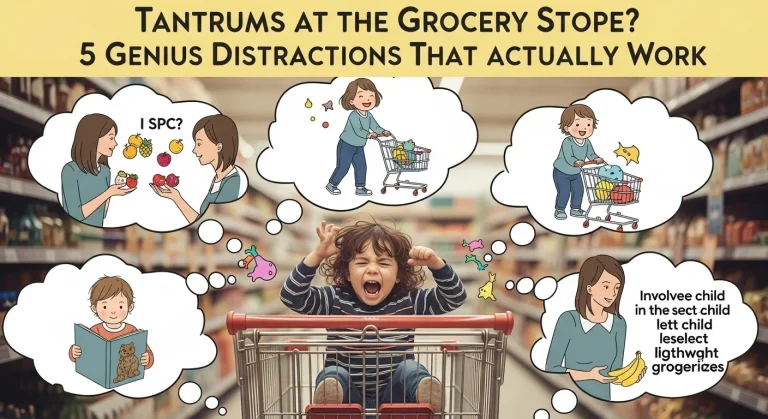Why Your Toddler’s Worst Tantrums Happen With You (And Why That’s a Good Thing)
🍼 Introduction
Ever wondered why your toddler saves their biggest, loudest, most chaotic meltdowns just for you?
Maybe they’ve been angels at daycare, well-behaved with grandparents, or polite around strangers — but the moment they get home, boom: the floodgates open.
It can feel frustrating, confusing, even hurtful. But what if we told you: those epic tantrums are actually a sign of something very, very good?
Let’s dive into the surprising psychology behind why toddlers “lose it” around parents — and how you can respond with confidence, compassion, and connection.

💡 1. You’re Their Safe Place (Even When It Doesn’t Feel Like It)
When toddlers act out more with you than others, it’s not because they “like misbehaving.” It’s because you’re the one person they trust unconditionally.
In developmental psychology, this is called the “safe base” effect — children feel secure enough with parents to drop their emotional guard. That includes big emotions they’ve held in all day.
Example:
A toddler may behave perfectly in daycare, but as soon as they see Mom or Dad, they explode. That’s not disrespect — it’s emotional unloading. You’re their emotional “hom

🔄 2. They’re Releasing Built-Up Stress
Think of your toddler’s brain like a tiny pressure cooker. Throughout the day, they face:
- Frustration from rules
- Sensory overload
- Social stress (even playdates can be overwhelming)
Once they’re with you, they release everything they’ve been bottling up — sometimes through tears, yelling, or meltdowns.
This isn’t bad behavior. It’s a release valve. You’re the one who allows them to fall apart — because they know you’ll still be there after.

😔 3. You Get the “Unfiltered” Version of Their Emotions
Your toddler wears a social mask around others — just like adults do.
With you, the mask comes off. That means:
- The sass
- The whining
- The full-on floor meltdowns
It’s not personal. It’s actually deeply personal — because your child knows they don’t have to perform for you.
This is an emotional compliment.
It means they see you as someone who can handle their rawest, most real feelings.

🧠 4. They’re Still Learning How to Regulate Emotions
Let’s not forget: toddlers are still building the brain structures required for self-control.
- The prefrontal cortex (logic, reasoning) is under construction
- The amygdala (emotion center) is in charge most of the time
That’s why toddlers:
- Scream when they’re tired instead of saying “I need rest”
- Hit instead of saying “I’m mad”
- Cry instead of saying “That hurt my feelings”
And since you’re the most emotionally available adult in their life, they practice these outbursts with you — again, because they can.

❤️ 5. You’re Also Where They Learn Emotional Recovery
One of the most overlooked parenting truths:
It’s not about stopping tantrums — it’s about what happens after.
When your child breaks down with you and you respond with:
- Calm presence
- Gentle boundaries
- Hugs, empathy, or even quiet space
…they learn how to recover.
This teaches:
- Self-regulation
- Emotional literacy
- That all feelings are allowed — but all actions are not
You’re not just weathering their storms — you’re teaching them how to calm their own seas later in life.

🤗 6. They’re Testing Connection, Not Just Limits
Toddlers test boundaries — but more often, they’re testing connection.
When they scream, “I hate you!” or push away your help, they may be silently asking:
“Will you still love me when I’m like this?”
Your consistent, calm response reassures them:
“Yes. I don’t love the behavior — but I still love you.”
These moments, while exhausting, reinforce attachment more than any praise ever could.

🛑 7. You’re Allowed to Feel Drained — But Not Defeated
It’s important to remember: just because tantrums are developmentally normal doesn’t mean they’re easy.
You might feel:
- Drained
- Angry
- Embarrassed
- Even resentful
That doesn’t make you a bad parent — it makes you human.
Use your support system. Take breaks. Let go of perfection.
Because while toddlers are learning how to manage their emotions, you’re learning too.
And every time you choose connection over control, you’re doing the real work of parenting.

💬 Final Thoughts: Tantrums Mean You’re Their Person
Next time your toddler has a meltdown just for you, try shifting the narrative.
It’s not:
“Why are they always like this with me?”
It’s:
“I must be the one they feel safest to be real with.”
That perspective won’t make every tantrum feel easier — but it might help you face them with more grace, strength, and compassion.
You’re not raising a perfectly behaved child.
You’re raising a human — one who knows it’s safe to feel, fall apart, and grow with you by their side.







